PACC6005: Economic Consequences of Disclosing Non-Financial Info
VerifiedAdded on 2023/04/04
|11
|2452
|180
Report
AI Summary
This report examines the economic consequences of disclosing non-financial information, including social and environmental performance. It identifies the nature of non-financial information and its economic consequences, discussing reporting methods like sustainability and integrated reporting. The analysis reviews journal articles to assess the impact of corporate social performance (CSR) disclosure on firm value, stock price, and cost of equity capital. Key findings indicate that non-financial information disclosure significantly affects firm valuation, cost of equity capital, market price of shares, stock liquidity, and institutional ownership. The report concludes that disclosing non-financial matters has considerable economic implications for organizations, providing valuable insights for strategic development and decision-making.

Running head: FINANCIAL ACCOUNTING
Financial accounting
Name of the student
Name of the university
Student ID
Author note
Financial accounting
Name of the student
Name of the university
Student ID
Author note
Paraphrase This Document
Need a fresh take? Get an instant paraphrase of this document with our AI Paraphraser
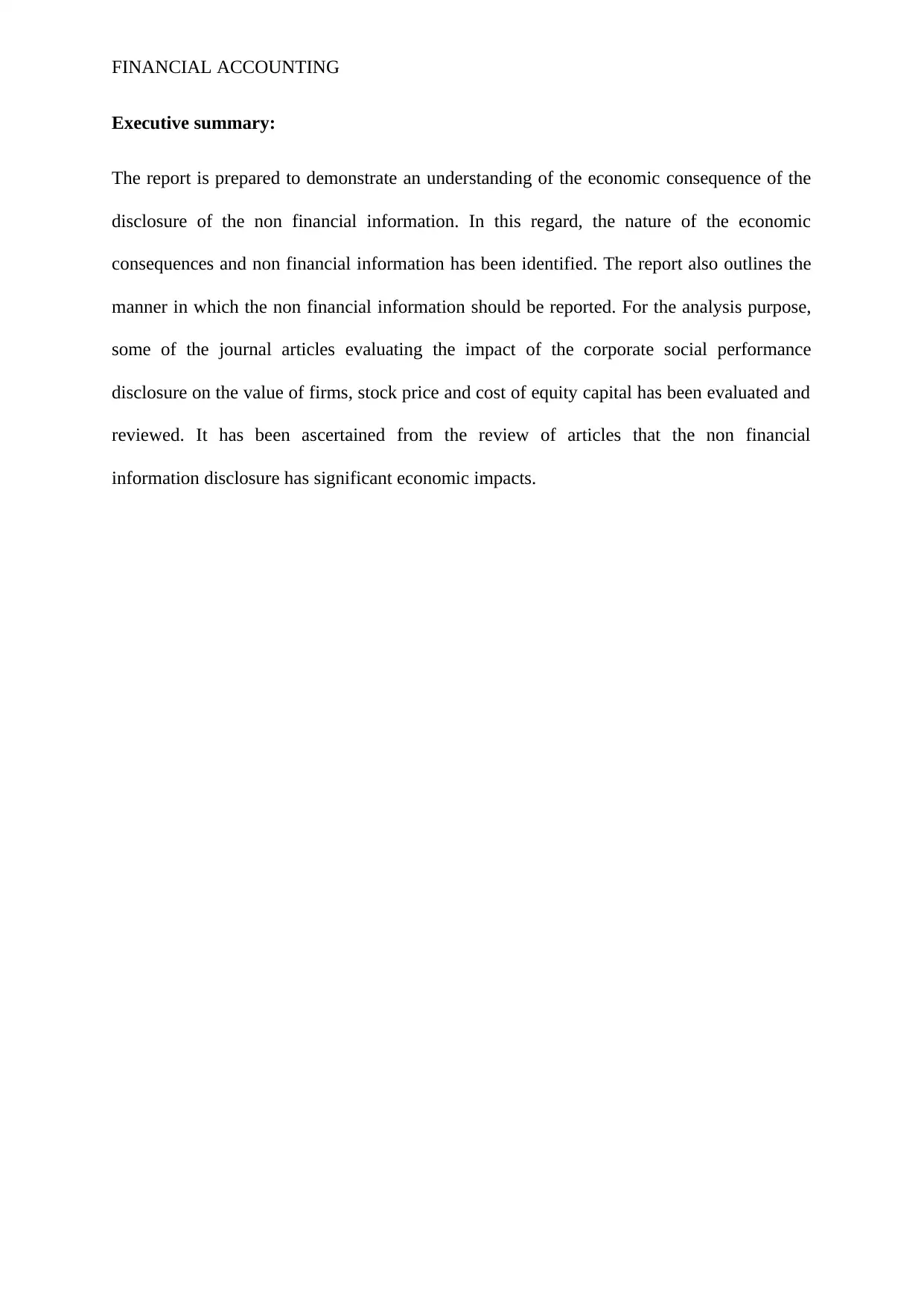
FINANCIAL ACCOUNTING
Executive summary:
The report is prepared to demonstrate an understanding of the economic consequence of the
disclosure of the non financial information. In this regard, the nature of the economic
consequences and non financial information has been identified. The report also outlines the
manner in which the non financial information should be reported. For the analysis purpose,
some of the journal articles evaluating the impact of the corporate social performance
disclosure on the value of firms, stock price and cost of equity capital has been evaluated and
reviewed. It has been ascertained from the review of articles that the non financial
information disclosure has significant economic impacts.
Executive summary:
The report is prepared to demonstrate an understanding of the economic consequence of the
disclosure of the non financial information. In this regard, the nature of the economic
consequences and non financial information has been identified. The report also outlines the
manner in which the non financial information should be reported. For the analysis purpose,
some of the journal articles evaluating the impact of the corporate social performance
disclosure on the value of firms, stock price and cost of equity capital has been evaluated and
reviewed. It has been ascertained from the review of articles that the non financial
information disclosure has significant economic impacts.
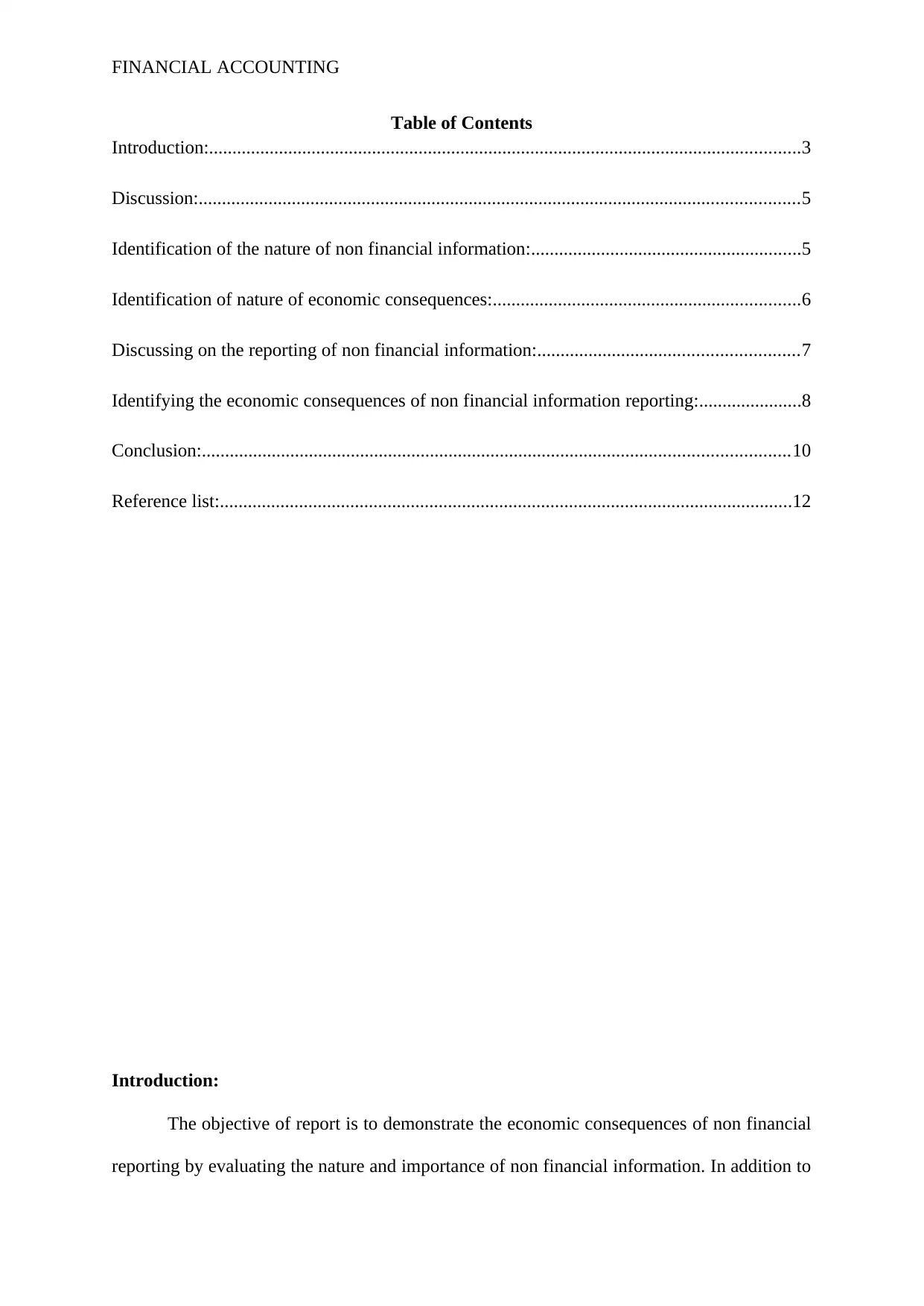
FINANCIAL ACCOUNTING
Table of Contents
Introduction:...............................................................................................................................3
Discussion:.................................................................................................................................5
Identification of the nature of non financial information:..........................................................5
Identification of nature of economic consequences:..................................................................6
Discussing on the reporting of non financial information:........................................................7
Identifying the economic consequences of non financial information reporting:......................8
Conclusion:..............................................................................................................................10
Reference list:...........................................................................................................................12
Introduction:
The objective of report is to demonstrate the economic consequences of non financial
reporting by evaluating the nature and importance of non financial information. In addition to
Table of Contents
Introduction:...............................................................................................................................3
Discussion:.................................................................................................................................5
Identification of the nature of non financial information:..........................................................5
Identification of nature of economic consequences:..................................................................6
Discussing on the reporting of non financial information:........................................................7
Identifying the economic consequences of non financial information reporting:......................8
Conclusion:..............................................................................................................................10
Reference list:...........................................................................................................................12
Introduction:
The objective of report is to demonstrate the economic consequences of non financial
reporting by evaluating the nature and importance of non financial information. In addition to
⊘ This is a preview!⊘
Do you want full access?
Subscribe today to unlock all pages.

Trusted by 1+ million students worldwide
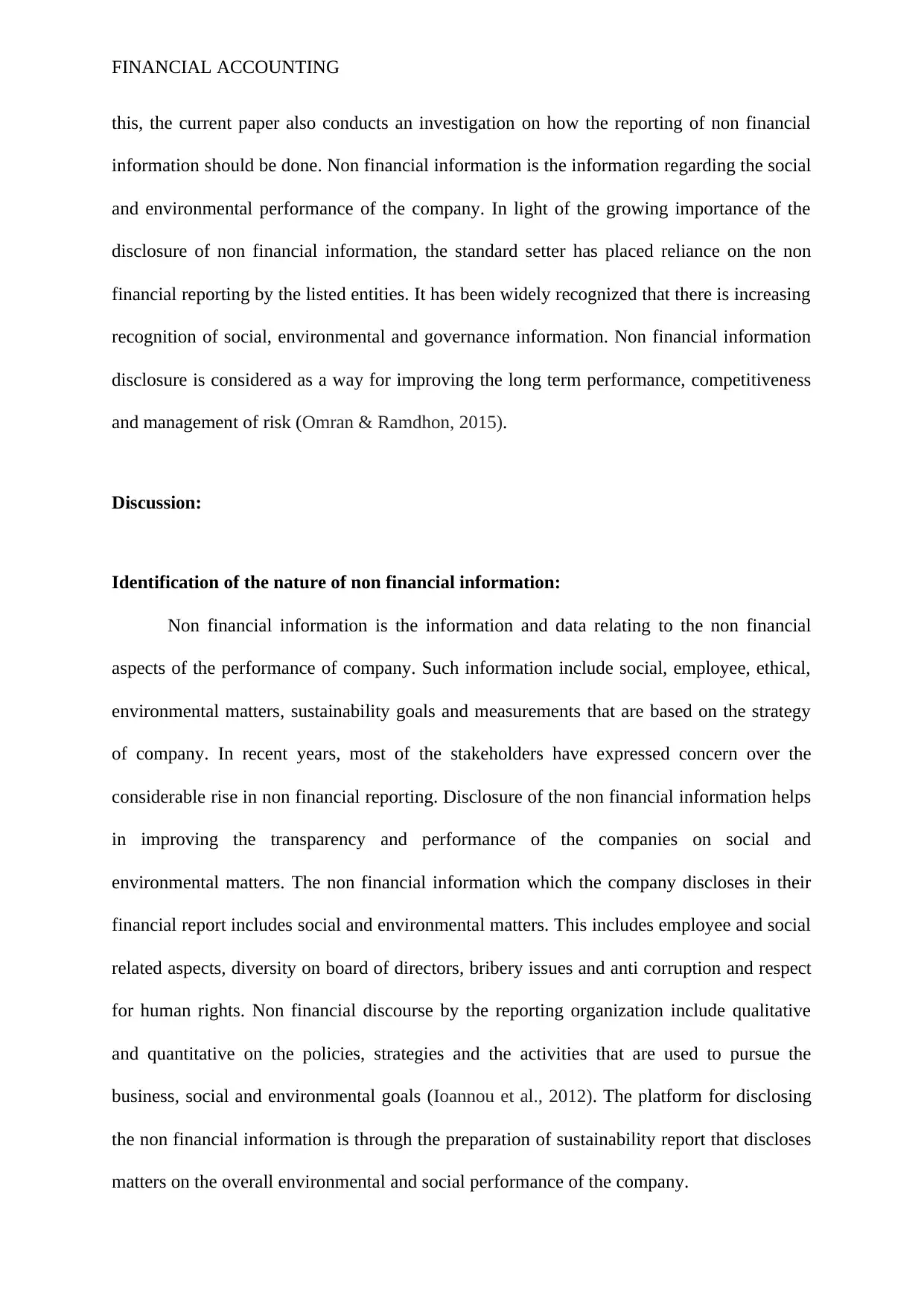
FINANCIAL ACCOUNTING
this, the current paper also conducts an investigation on how the reporting of non financial
information should be done. Non financial information is the information regarding the social
and environmental performance of the company. In light of the growing importance of the
disclosure of non financial information, the standard setter has placed reliance on the non
financial reporting by the listed entities. It has been widely recognized that there is increasing
recognition of social, environmental and governance information. Non financial information
disclosure is considered as a way for improving the long term performance, competitiveness
and management of risk (Omran & Ramdhon, 2015).
Discussion:
Identification of the nature of non financial information:
Non financial information is the information and data relating to the non financial
aspects of the performance of company. Such information include social, employee, ethical,
environmental matters, sustainability goals and measurements that are based on the strategy
of company. In recent years, most of the stakeholders have expressed concern over the
considerable rise in non financial reporting. Disclosure of the non financial information helps
in improving the transparency and performance of the companies on social and
environmental matters. The non financial information which the company discloses in their
financial report includes social and environmental matters. This includes employee and social
related aspects, diversity on board of directors, bribery issues and anti corruption and respect
for human rights. Non financial discourse by the reporting organization include qualitative
and quantitative on the policies, strategies and the activities that are used to pursue the
business, social and environmental goals (Ioannou et al., 2012). The platform for disclosing
the non financial information is through the preparation of sustainability report that discloses
matters on the overall environmental and social performance of the company.
this, the current paper also conducts an investigation on how the reporting of non financial
information should be done. Non financial information is the information regarding the social
and environmental performance of the company. In light of the growing importance of the
disclosure of non financial information, the standard setter has placed reliance on the non
financial reporting by the listed entities. It has been widely recognized that there is increasing
recognition of social, environmental and governance information. Non financial information
disclosure is considered as a way for improving the long term performance, competitiveness
and management of risk (Omran & Ramdhon, 2015).
Discussion:
Identification of the nature of non financial information:
Non financial information is the information and data relating to the non financial
aspects of the performance of company. Such information include social, employee, ethical,
environmental matters, sustainability goals and measurements that are based on the strategy
of company. In recent years, most of the stakeholders have expressed concern over the
considerable rise in non financial reporting. Disclosure of the non financial information helps
in improving the transparency and performance of the companies on social and
environmental matters. The non financial information which the company discloses in their
financial report includes social and environmental matters. This includes employee and social
related aspects, diversity on board of directors, bribery issues and anti corruption and respect
for human rights. Non financial discourse by the reporting organization include qualitative
and quantitative on the policies, strategies and the activities that are used to pursue the
business, social and environmental goals (Ioannou et al., 2012). The platform for disclosing
the non financial information is through the preparation of sustainability report that discloses
matters on the overall environmental and social performance of the company.
Paraphrase This Document
Need a fresh take? Get an instant paraphrase of this document with our AI Paraphraser
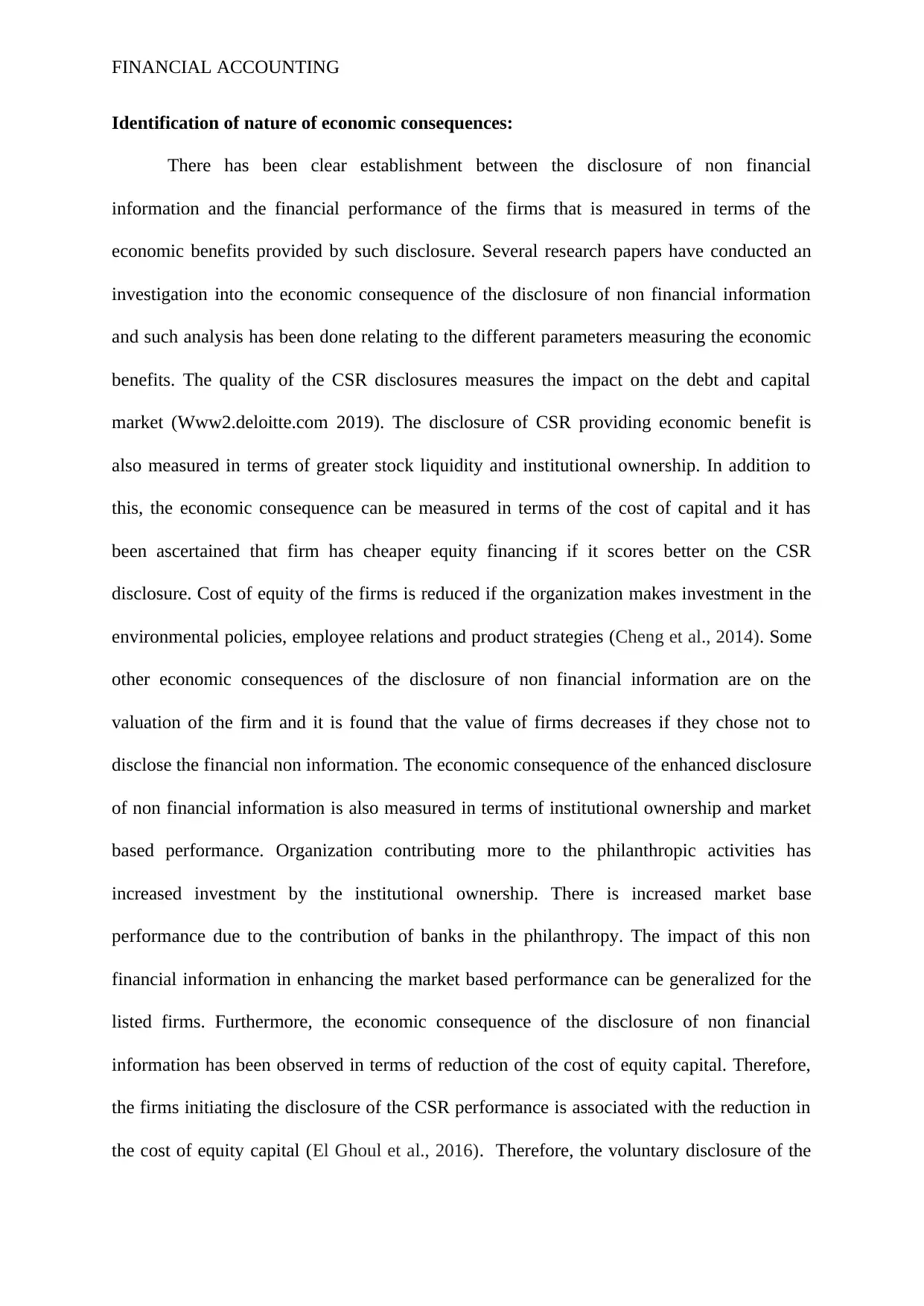
FINANCIAL ACCOUNTING
Identification of nature of economic consequences:
There has been clear establishment between the disclosure of non financial
information and the financial performance of the firms that is measured in terms of the
economic benefits provided by such disclosure. Several research papers have conducted an
investigation into the economic consequence of the disclosure of non financial information
and such analysis has been done relating to the different parameters measuring the economic
benefits. The quality of the CSR disclosures measures the impact on the debt and capital
market (Www2.deloitte.com 2019). The disclosure of CSR providing economic benefit is
also measured in terms of greater stock liquidity and institutional ownership. In addition to
this, the economic consequence can be measured in terms of the cost of capital and it has
been ascertained that firm has cheaper equity financing if it scores better on the CSR
disclosure. Cost of equity of the firms is reduced if the organization makes investment in the
environmental policies, employee relations and product strategies (Cheng et al., 2014). Some
other economic consequences of the disclosure of non financial information are on the
valuation of the firm and it is found that the value of firms decreases if they chose not to
disclose the financial non information. The economic consequence of the enhanced disclosure
of non financial information is also measured in terms of institutional ownership and market
based performance. Organization contributing more to the philanthropic activities has
increased investment by the institutional ownership. There is increased market base
performance due to the contribution of banks in the philanthropy. The impact of this non
financial information in enhancing the market based performance can be generalized for the
listed firms. Furthermore, the economic consequence of the disclosure of non financial
information has been observed in terms of reduction of the cost of equity capital. Therefore,
the firms initiating the disclosure of the CSR performance is associated with the reduction in
the cost of equity capital (El Ghoul et al., 2016). Therefore, the voluntary disclosure of the
Identification of nature of economic consequences:
There has been clear establishment between the disclosure of non financial
information and the financial performance of the firms that is measured in terms of the
economic benefits provided by such disclosure. Several research papers have conducted an
investigation into the economic consequence of the disclosure of non financial information
and such analysis has been done relating to the different parameters measuring the economic
benefits. The quality of the CSR disclosures measures the impact on the debt and capital
market (Www2.deloitte.com 2019). The disclosure of CSR providing economic benefit is
also measured in terms of greater stock liquidity and institutional ownership. In addition to
this, the economic consequence can be measured in terms of the cost of capital and it has
been ascertained that firm has cheaper equity financing if it scores better on the CSR
disclosure. Cost of equity of the firms is reduced if the organization makes investment in the
environmental policies, employee relations and product strategies (Cheng et al., 2014). Some
other economic consequences of the disclosure of non financial information are on the
valuation of the firm and it is found that the value of firms decreases if they chose not to
disclose the financial non information. The economic consequence of the enhanced disclosure
of non financial information is also measured in terms of institutional ownership and market
based performance. Organization contributing more to the philanthropic activities has
increased investment by the institutional ownership. There is increased market base
performance due to the contribution of banks in the philanthropy. The impact of this non
financial information in enhancing the market based performance can be generalized for the
listed firms. Furthermore, the economic consequence of the disclosure of non financial
information has been observed in terms of reduction of the cost of equity capital. Therefore,
the firms initiating the disclosure of the CSR performance is associated with the reduction in
the cost of equity capital (El Ghoul et al., 2016). Therefore, the voluntary disclosure of the
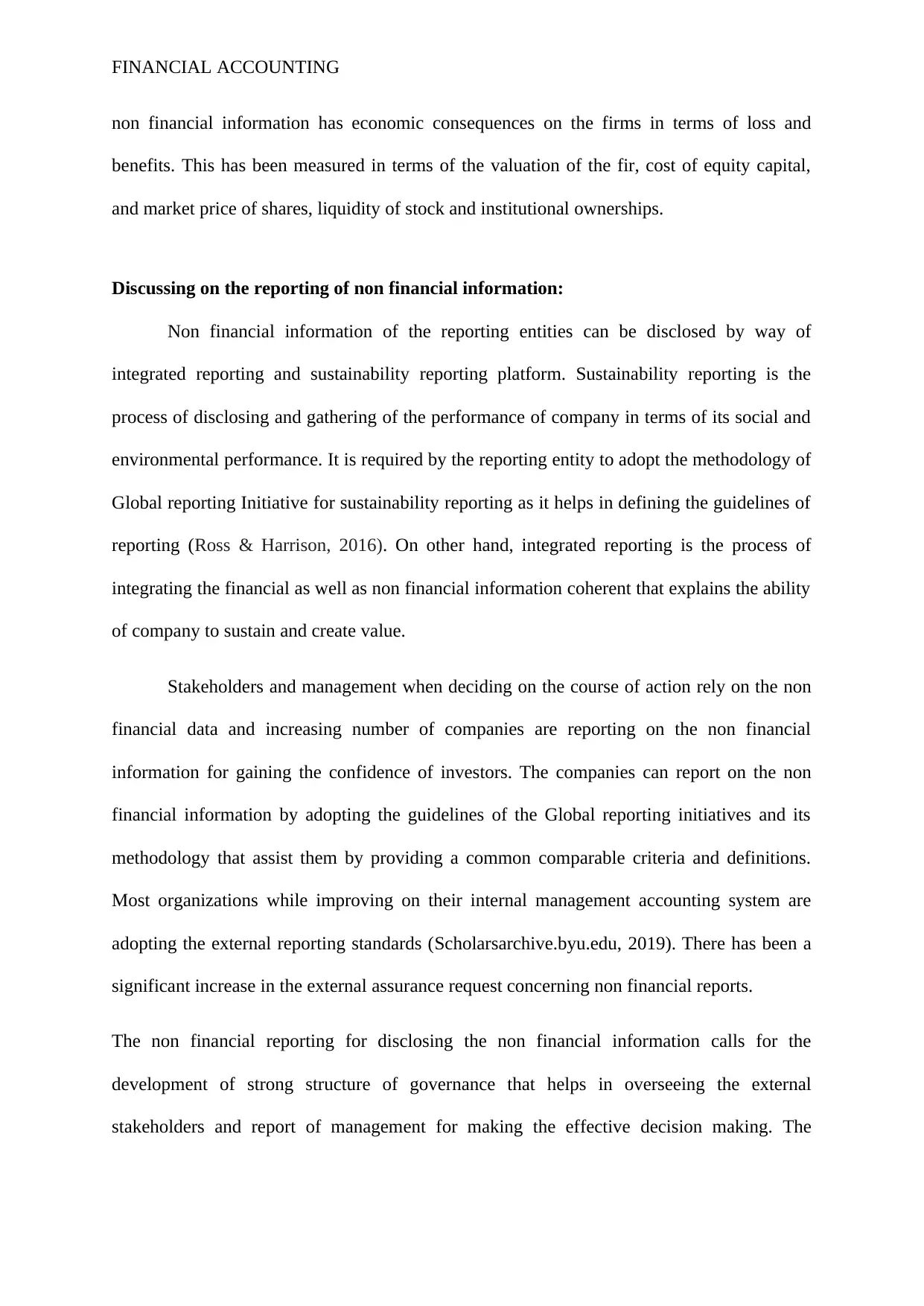
FINANCIAL ACCOUNTING
non financial information has economic consequences on the firms in terms of loss and
benefits. This has been measured in terms of the valuation of the fir, cost of equity capital,
and market price of shares, liquidity of stock and institutional ownerships.
Discussing on the reporting of non financial information:
Non financial information of the reporting entities can be disclosed by way of
integrated reporting and sustainability reporting platform. Sustainability reporting is the
process of disclosing and gathering of the performance of company in terms of its social and
environmental performance. It is required by the reporting entity to adopt the methodology of
Global reporting Initiative for sustainability reporting as it helps in defining the guidelines of
reporting (Ross & Harrison, 2016). On other hand, integrated reporting is the process of
integrating the financial as well as non financial information coherent that explains the ability
of company to sustain and create value.
Stakeholders and management when deciding on the course of action rely on the non
financial data and increasing number of companies are reporting on the non financial
information for gaining the confidence of investors. The companies can report on the non
financial information by adopting the guidelines of the Global reporting initiatives and its
methodology that assist them by providing a common comparable criteria and definitions.
Most organizations while improving on their internal management accounting system are
adopting the external reporting standards (Scholarsarchive.byu.edu, 2019). There has been a
significant increase in the external assurance request concerning non financial reports.
The non financial reporting for disclosing the non financial information calls for the
development of strong structure of governance that helps in overseeing the external
stakeholders and report of management for making the effective decision making. The
non financial information has economic consequences on the firms in terms of loss and
benefits. This has been measured in terms of the valuation of the fir, cost of equity capital,
and market price of shares, liquidity of stock and institutional ownerships.
Discussing on the reporting of non financial information:
Non financial information of the reporting entities can be disclosed by way of
integrated reporting and sustainability reporting platform. Sustainability reporting is the
process of disclosing and gathering of the performance of company in terms of its social and
environmental performance. It is required by the reporting entity to adopt the methodology of
Global reporting Initiative for sustainability reporting as it helps in defining the guidelines of
reporting (Ross & Harrison, 2016). On other hand, integrated reporting is the process of
integrating the financial as well as non financial information coherent that explains the ability
of company to sustain and create value.
Stakeholders and management when deciding on the course of action rely on the non
financial data and increasing number of companies are reporting on the non financial
information for gaining the confidence of investors. The companies can report on the non
financial information by adopting the guidelines of the Global reporting initiatives and its
methodology that assist them by providing a common comparable criteria and definitions.
Most organizations while improving on their internal management accounting system are
adopting the external reporting standards (Scholarsarchive.byu.edu, 2019). There has been a
significant increase in the external assurance request concerning non financial reports.
The non financial reporting for disclosing the non financial information calls for the
development of strong structure of governance that helps in overseeing the external
stakeholders and report of management for making the effective decision making. The
⊘ This is a preview!⊘
Do you want full access?
Subscribe today to unlock all pages.

Trusted by 1+ million students worldwide
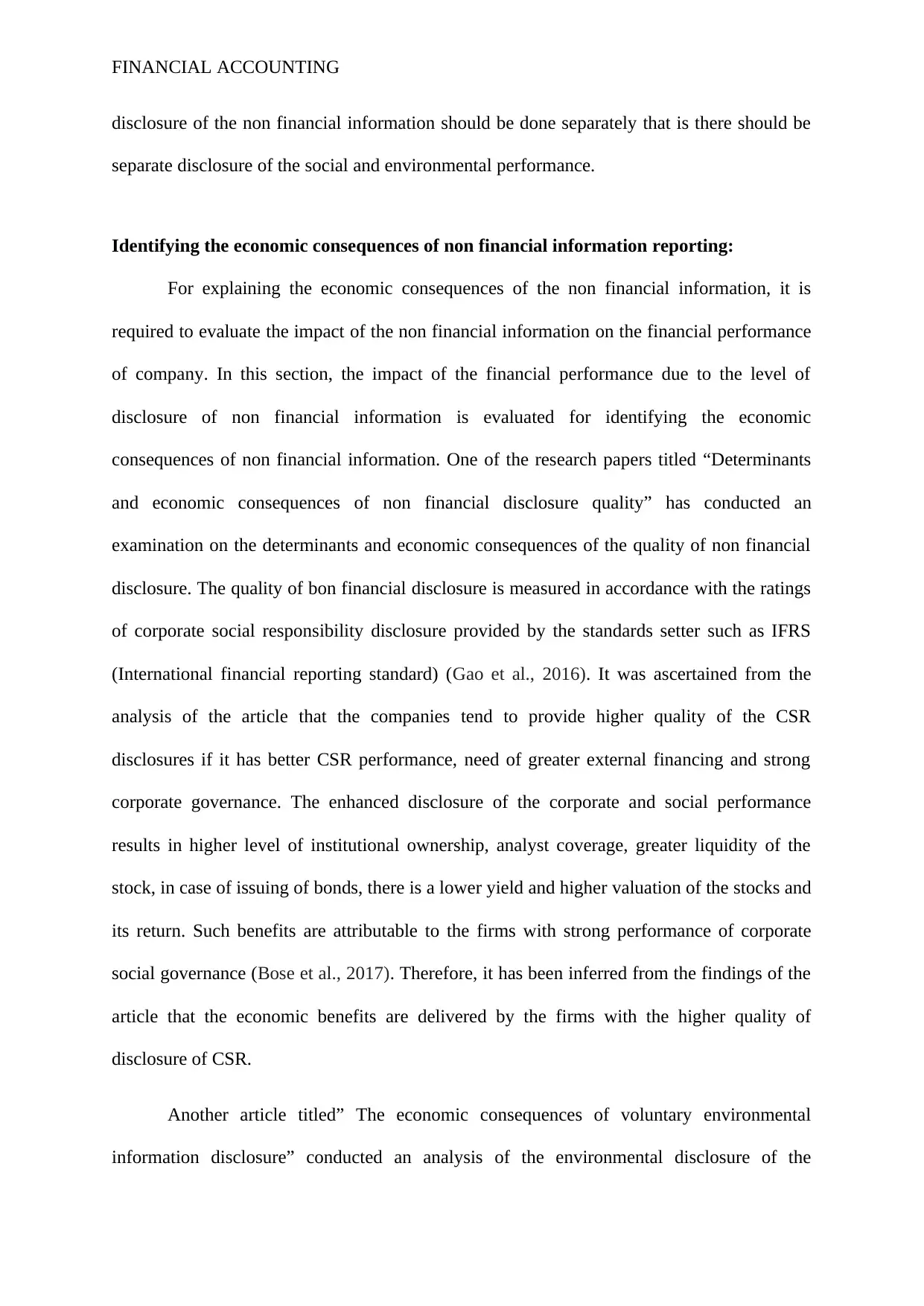
FINANCIAL ACCOUNTING
disclosure of the non financial information should be done separately that is there should be
separate disclosure of the social and environmental performance.
Identifying the economic consequences of non financial information reporting:
For explaining the economic consequences of the non financial information, it is
required to evaluate the impact of the non financial information on the financial performance
of company. In this section, the impact of the financial performance due to the level of
disclosure of non financial information is evaluated for identifying the economic
consequences of non financial information. One of the research papers titled “Determinants
and economic consequences of non financial disclosure quality” has conducted an
examination on the determinants and economic consequences of the quality of non financial
disclosure. The quality of bon financial disclosure is measured in accordance with the ratings
of corporate social responsibility disclosure provided by the standards setter such as IFRS
(International financial reporting standard) (Gao et al., 2016). It was ascertained from the
analysis of the article that the companies tend to provide higher quality of the CSR
disclosures if it has better CSR performance, need of greater external financing and strong
corporate governance. The enhanced disclosure of the corporate and social performance
results in higher level of institutional ownership, analyst coverage, greater liquidity of the
stock, in case of issuing of bonds, there is a lower yield and higher valuation of the stocks and
its return. Such benefits are attributable to the firms with strong performance of corporate
social governance (Bose et al., 2017). Therefore, it has been inferred from the findings of the
article that the economic benefits are delivered by the firms with the higher quality of
disclosure of CSR.
Another article titled” The economic consequences of voluntary environmental
information disclosure” conducted an analysis of the environmental disclosure of the
disclosure of the non financial information should be done separately that is there should be
separate disclosure of the social and environmental performance.
Identifying the economic consequences of non financial information reporting:
For explaining the economic consequences of the non financial information, it is
required to evaluate the impact of the non financial information on the financial performance
of company. In this section, the impact of the financial performance due to the level of
disclosure of non financial information is evaluated for identifying the economic
consequences of non financial information. One of the research papers titled “Determinants
and economic consequences of non financial disclosure quality” has conducted an
examination on the determinants and economic consequences of the quality of non financial
disclosure. The quality of bon financial disclosure is measured in accordance with the ratings
of corporate social responsibility disclosure provided by the standards setter such as IFRS
(International financial reporting standard) (Gao et al., 2016). It was ascertained from the
analysis of the article that the companies tend to provide higher quality of the CSR
disclosures if it has better CSR performance, need of greater external financing and strong
corporate governance. The enhanced disclosure of the corporate and social performance
results in higher level of institutional ownership, analyst coverage, greater liquidity of the
stock, in case of issuing of bonds, there is a lower yield and higher valuation of the stocks and
its return. Such benefits are attributable to the firms with strong performance of corporate
social governance (Bose et al., 2017). Therefore, it has been inferred from the findings of the
article that the economic benefits are delivered by the firms with the higher quality of
disclosure of CSR.
Another article titled” The economic consequences of voluntary environmental
information disclosure” conducted an analysis of the environmental disclosure of the
Paraphrase This Document
Need a fresh take? Get an instant paraphrase of this document with our AI Paraphraser
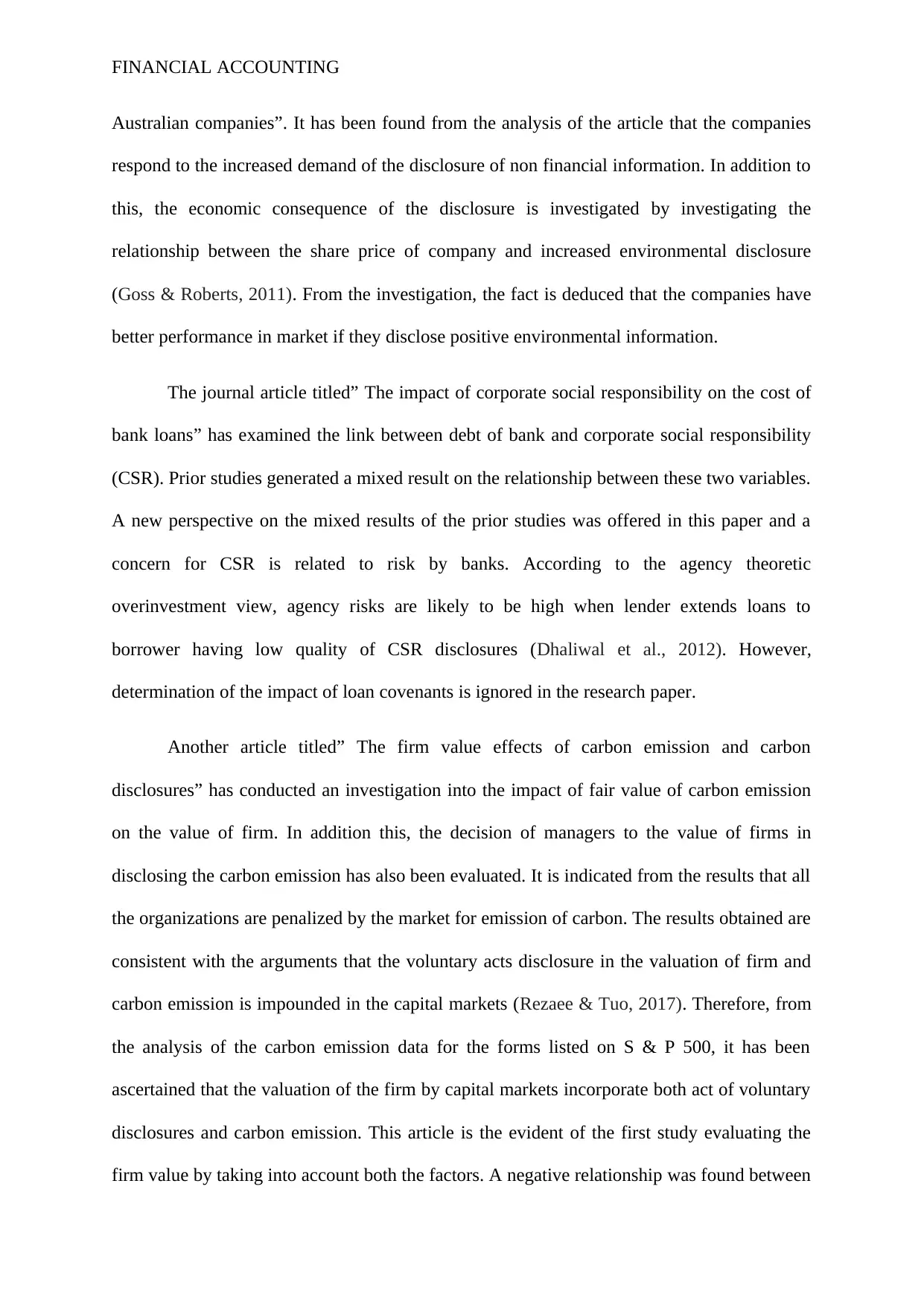
FINANCIAL ACCOUNTING
Australian companies”. It has been found from the analysis of the article that the companies
respond to the increased demand of the disclosure of non financial information. In addition to
this, the economic consequence of the disclosure is investigated by investigating the
relationship between the share price of company and increased environmental disclosure
(Goss & Roberts, 2011). From the investigation, the fact is deduced that the companies have
better performance in market if they disclose positive environmental information.
The journal article titled” The impact of corporate social responsibility on the cost of
bank loans” has examined the link between debt of bank and corporate social responsibility
(CSR). Prior studies generated a mixed result on the relationship between these two variables.
A new perspective on the mixed results of the prior studies was offered in this paper and a
concern for CSR is related to risk by banks. According to the agency theoretic
overinvestment view, agency risks are likely to be high when lender extends loans to
borrower having low quality of CSR disclosures (Dhaliwal et al., 2012). However,
determination of the impact of loan covenants is ignored in the research paper.
Another article titled” The firm value effects of carbon emission and carbon
disclosures” has conducted an investigation into the impact of fair value of carbon emission
on the value of firm. In addition this, the decision of managers to the value of firms in
disclosing the carbon emission has also been evaluated. It is indicated from the results that all
the organizations are penalized by the market for emission of carbon. The results obtained are
consistent with the arguments that the voluntary acts disclosure in the valuation of firm and
carbon emission is impounded in the capital markets (Rezaee & Tuo, 2017). Therefore, from
the analysis of the carbon emission data for the forms listed on S & P 500, it has been
ascertained that the valuation of the firm by capital markets incorporate both act of voluntary
disclosures and carbon emission. This article is the evident of the first study evaluating the
firm value by taking into account both the factors. A negative relationship was found between
Australian companies”. It has been found from the analysis of the article that the companies
respond to the increased demand of the disclosure of non financial information. In addition to
this, the economic consequence of the disclosure is investigated by investigating the
relationship between the share price of company and increased environmental disclosure
(Goss & Roberts, 2011). From the investigation, the fact is deduced that the companies have
better performance in market if they disclose positive environmental information.
The journal article titled” The impact of corporate social responsibility on the cost of
bank loans” has examined the link between debt of bank and corporate social responsibility
(CSR). Prior studies generated a mixed result on the relationship between these two variables.
A new perspective on the mixed results of the prior studies was offered in this paper and a
concern for CSR is related to risk by banks. According to the agency theoretic
overinvestment view, agency risks are likely to be high when lender extends loans to
borrower having low quality of CSR disclosures (Dhaliwal et al., 2012). However,
determination of the impact of loan covenants is ignored in the research paper.
Another article titled” The firm value effects of carbon emission and carbon
disclosures” has conducted an investigation into the impact of fair value of carbon emission
on the value of firm. In addition this, the decision of managers to the value of firms in
disclosing the carbon emission has also been evaluated. It is indicated from the results that all
the organizations are penalized by the market for emission of carbon. The results obtained are
consistent with the arguments that the voluntary acts disclosure in the valuation of firm and
carbon emission is impounded in the capital markets (Rezaee & Tuo, 2017). Therefore, from
the analysis of the carbon emission data for the forms listed on S & P 500, it has been
ascertained that the valuation of the firm by capital markets incorporate both act of voluntary
disclosures and carbon emission. This article is the evident of the first study evaluating the
firm value by taking into account both the factors. A negative relationship was found between
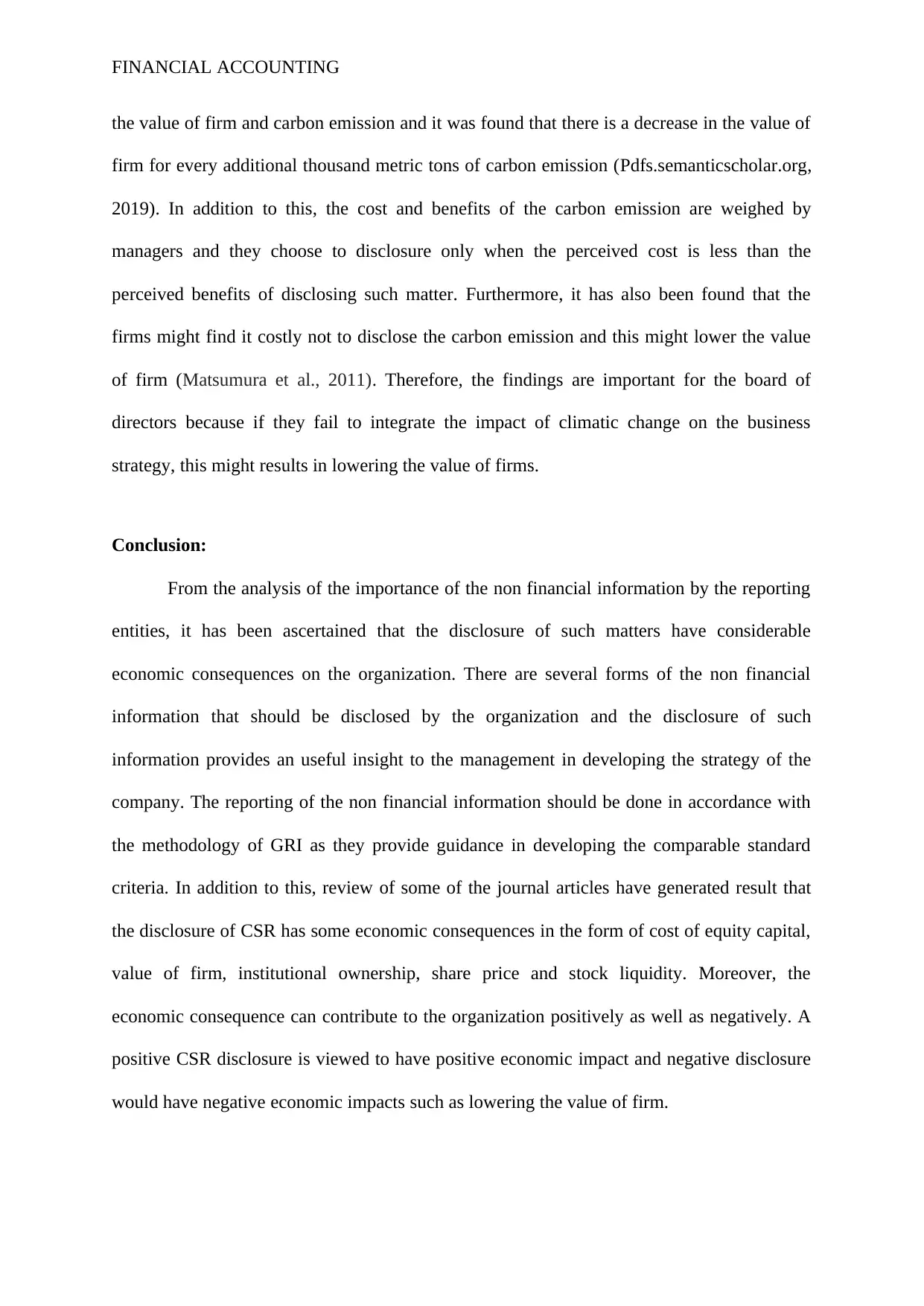
FINANCIAL ACCOUNTING
the value of firm and carbon emission and it was found that there is a decrease in the value of
firm for every additional thousand metric tons of carbon emission (Pdfs.semanticscholar.org,
2019). In addition to this, the cost and benefits of the carbon emission are weighed by
managers and they choose to disclosure only when the perceived cost is less than the
perceived benefits of disclosing such matter. Furthermore, it has also been found that the
firms might find it costly not to disclose the carbon emission and this might lower the value
of firm (Matsumura et al., 2011). Therefore, the findings are important for the board of
directors because if they fail to integrate the impact of climatic change on the business
strategy, this might results in lowering the value of firms.
Conclusion:
From the analysis of the importance of the non financial information by the reporting
entities, it has been ascertained that the disclosure of such matters have considerable
economic consequences on the organization. There are several forms of the non financial
information that should be disclosed by the organization and the disclosure of such
information provides an useful insight to the management in developing the strategy of the
company. The reporting of the non financial information should be done in accordance with
the methodology of GRI as they provide guidance in developing the comparable standard
criteria. In addition to this, review of some of the journal articles have generated result that
the disclosure of CSR has some economic consequences in the form of cost of equity capital,
value of firm, institutional ownership, share price and stock liquidity. Moreover, the
economic consequence can contribute to the organization positively as well as negatively. A
positive CSR disclosure is viewed to have positive economic impact and negative disclosure
would have negative economic impacts such as lowering the value of firm.
the value of firm and carbon emission and it was found that there is a decrease in the value of
firm for every additional thousand metric tons of carbon emission (Pdfs.semanticscholar.org,
2019). In addition to this, the cost and benefits of the carbon emission are weighed by
managers and they choose to disclosure only when the perceived cost is less than the
perceived benefits of disclosing such matter. Furthermore, it has also been found that the
firms might find it costly not to disclose the carbon emission and this might lower the value
of firm (Matsumura et al., 2011). Therefore, the findings are important for the board of
directors because if they fail to integrate the impact of climatic change on the business
strategy, this might results in lowering the value of firms.
Conclusion:
From the analysis of the importance of the non financial information by the reporting
entities, it has been ascertained that the disclosure of such matters have considerable
economic consequences on the organization. There are several forms of the non financial
information that should be disclosed by the organization and the disclosure of such
information provides an useful insight to the management in developing the strategy of the
company. The reporting of the non financial information should be done in accordance with
the methodology of GRI as they provide guidance in developing the comparable standard
criteria. In addition to this, review of some of the journal articles have generated result that
the disclosure of CSR has some economic consequences in the form of cost of equity capital,
value of firm, institutional ownership, share price and stock liquidity. Moreover, the
economic consequence can contribute to the organization positively as well as negatively. A
positive CSR disclosure is viewed to have positive economic impact and negative disclosure
would have negative economic impacts such as lowering the value of firm.
⊘ This is a preview!⊘
Do you want full access?
Subscribe today to unlock all pages.

Trusted by 1+ million students worldwide
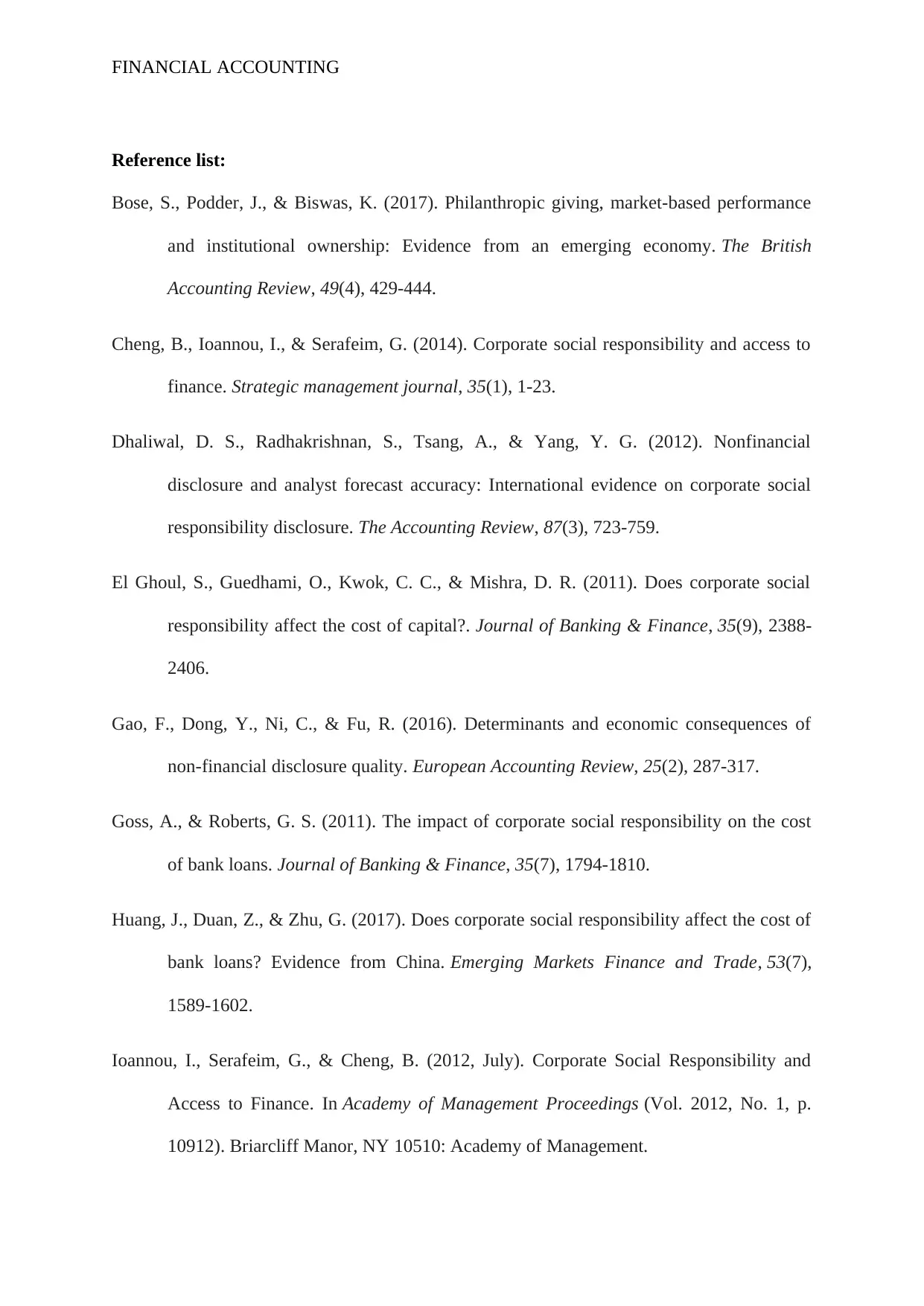
FINANCIAL ACCOUNTING
Reference list:
Bose, S., Podder, J., & Biswas, K. (2017). Philanthropic giving, market-based performance
and institutional ownership: Evidence from an emerging economy. The British
Accounting Review, 49(4), 429-444.
Cheng, B., Ioannou, I., & Serafeim, G. (2014). Corporate social responsibility and access to
finance. Strategic management journal, 35(1), 1-23.
Dhaliwal, D. S., Radhakrishnan, S., Tsang, A., & Yang, Y. G. (2012). Nonfinancial
disclosure and analyst forecast accuracy: International evidence on corporate social
responsibility disclosure. The Accounting Review, 87(3), 723-759.
El Ghoul, S., Guedhami, O., Kwok, C. C., & Mishra, D. R. (2011). Does corporate social
responsibility affect the cost of capital?. Journal of Banking & Finance, 35(9), 2388-
2406.
Gao, F., Dong, Y., Ni, C., & Fu, R. (2016). Determinants and economic consequences of
non-financial disclosure quality. European Accounting Review, 25(2), 287-317.
Goss, A., & Roberts, G. S. (2011). The impact of corporate social responsibility on the cost
of bank loans. Journal of Banking & Finance, 35(7), 1794-1810.
Huang, J., Duan, Z., & Zhu, G. (2017). Does corporate social responsibility affect the cost of
bank loans? Evidence from China. Emerging Markets Finance and Trade, 53(7),
1589-1602.
Ioannou, I., Serafeim, G., & Cheng, B. (2012, July). Corporate Social Responsibility and
Access to Finance. In Academy of Management Proceedings (Vol. 2012, No. 1, p.
10912). Briarcliff Manor, NY 10510: Academy of Management.
Reference list:
Bose, S., Podder, J., & Biswas, K. (2017). Philanthropic giving, market-based performance
and institutional ownership: Evidence from an emerging economy. The British
Accounting Review, 49(4), 429-444.
Cheng, B., Ioannou, I., & Serafeim, G. (2014). Corporate social responsibility and access to
finance. Strategic management journal, 35(1), 1-23.
Dhaliwal, D. S., Radhakrishnan, S., Tsang, A., & Yang, Y. G. (2012). Nonfinancial
disclosure and analyst forecast accuracy: International evidence on corporate social
responsibility disclosure. The Accounting Review, 87(3), 723-759.
El Ghoul, S., Guedhami, O., Kwok, C. C., & Mishra, D. R. (2011). Does corporate social
responsibility affect the cost of capital?. Journal of Banking & Finance, 35(9), 2388-
2406.
Gao, F., Dong, Y., Ni, C., & Fu, R. (2016). Determinants and economic consequences of
non-financial disclosure quality. European Accounting Review, 25(2), 287-317.
Goss, A., & Roberts, G. S. (2011). The impact of corporate social responsibility on the cost
of bank loans. Journal of Banking & Finance, 35(7), 1794-1810.
Huang, J., Duan, Z., & Zhu, G. (2017). Does corporate social responsibility affect the cost of
bank loans? Evidence from China. Emerging Markets Finance and Trade, 53(7),
1589-1602.
Ioannou, I., Serafeim, G., & Cheng, B. (2012, July). Corporate Social Responsibility and
Access to Finance. In Academy of Management Proceedings (Vol. 2012, No. 1, p.
10912). Briarcliff Manor, NY 10510: Academy of Management.
Paraphrase This Document
Need a fresh take? Get an instant paraphrase of this document with our AI Paraphraser
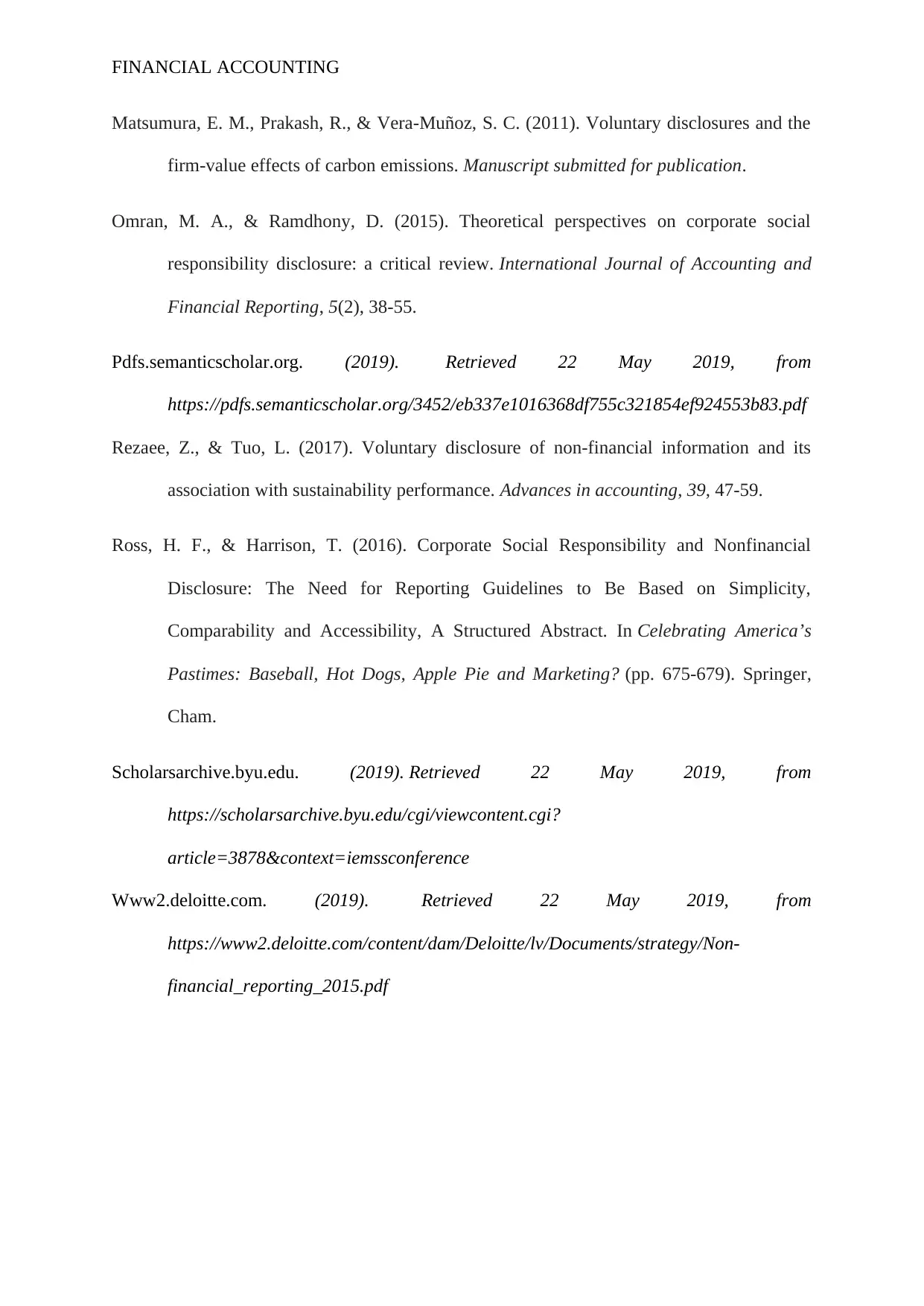
FINANCIAL ACCOUNTING
Matsumura, E. M., Prakash, R., & Vera-Muñoz, S. C. (2011). Voluntary disclosures and the
firm-value effects of carbon emissions. Manuscript submitted for publication.
Omran, M. A., & Ramdhony, D. (2015). Theoretical perspectives on corporate social
responsibility disclosure: a critical review. International Journal of Accounting and
Financial Reporting, 5(2), 38-55.
Pdfs.semanticscholar.org. (2019). Retrieved 22 May 2019, from
https://pdfs.semanticscholar.org/3452/eb337e1016368df755c321854ef924553b83.pdf
Rezaee, Z., & Tuo, L. (2017). Voluntary disclosure of non-financial information and its
association with sustainability performance. Advances in accounting, 39, 47-59.
Ross, H. F., & Harrison, T. (2016). Corporate Social Responsibility and Nonfinancial
Disclosure: The Need for Reporting Guidelines to Be Based on Simplicity,
Comparability and Accessibility, A Structured Abstract. In Celebrating America’s
Pastimes: Baseball, Hot Dogs, Apple Pie and Marketing? (pp. 675-679). Springer,
Cham.
Scholarsarchive.byu.edu. (2019). Retrieved 22 May 2019, from
https://scholarsarchive.byu.edu/cgi/viewcontent.cgi?
article=3878&context=iemssconference
Www2.deloitte.com. (2019). Retrieved 22 May 2019, from
https://www2.deloitte.com/content/dam/Deloitte/lv/Documents/strategy/Non-
financial_reporting_2015.pdf
Matsumura, E. M., Prakash, R., & Vera-Muñoz, S. C. (2011). Voluntary disclosures and the
firm-value effects of carbon emissions. Manuscript submitted for publication.
Omran, M. A., & Ramdhony, D. (2015). Theoretical perspectives on corporate social
responsibility disclosure: a critical review. International Journal of Accounting and
Financial Reporting, 5(2), 38-55.
Pdfs.semanticscholar.org. (2019). Retrieved 22 May 2019, from
https://pdfs.semanticscholar.org/3452/eb337e1016368df755c321854ef924553b83.pdf
Rezaee, Z., & Tuo, L. (2017). Voluntary disclosure of non-financial information and its
association with sustainability performance. Advances in accounting, 39, 47-59.
Ross, H. F., & Harrison, T. (2016). Corporate Social Responsibility and Nonfinancial
Disclosure: The Need for Reporting Guidelines to Be Based on Simplicity,
Comparability and Accessibility, A Structured Abstract. In Celebrating America’s
Pastimes: Baseball, Hot Dogs, Apple Pie and Marketing? (pp. 675-679). Springer,
Cham.
Scholarsarchive.byu.edu. (2019). Retrieved 22 May 2019, from
https://scholarsarchive.byu.edu/cgi/viewcontent.cgi?
article=3878&context=iemssconference
Www2.deloitte.com. (2019). Retrieved 22 May 2019, from
https://www2.deloitte.com/content/dam/Deloitte/lv/Documents/strategy/Non-
financial_reporting_2015.pdf
1 out of 11
Related Documents
Your All-in-One AI-Powered Toolkit for Academic Success.
+13062052269
info@desklib.com
Available 24*7 on WhatsApp / Email
![[object Object]](/_next/static/media/star-bottom.7253800d.svg)
Unlock your academic potential
Copyright © 2020–2025 A2Z Services. All Rights Reserved. Developed and managed by ZUCOL.




